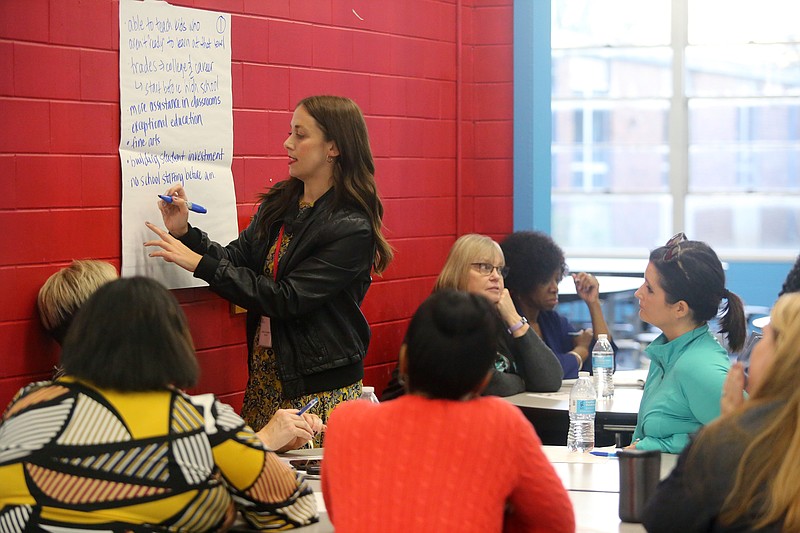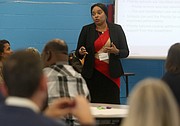What do schools, especially those that are struggling and under-performing, need to be successful?
Student supports, shared leadership, accountability, cultural awareness and flexibility, schools officials say.
How can the Tennessee Department of Education help such schools and their school districts and what role should the state play?
Allow districts to have flexibility when making policies, incentivize districts that think outside the box to meet student needs, provide more resources or support for wraparound services that meet students' non-academic needs and do away with the Achievement School District.
These were some of the questions - and answers - posed to the mix of community members, parents, educators, local school district leaders and government officials by several state education department officials at Brainerd High School Monday night.
School Turnaround Listening Tour Schedule
— Oct. 22: Ed Rice Community Center, Shelby County— Oct. 23: Wooddale High School, Shelby County— Oct. 28: Brainerd High School, Hamilton County— Oct. 29: American Red Cross, Davidson County— Oct. 30: Liberty Technology Magnet High School, Jackson-Madison County— Nov. 4: American Red Cross, Davidson County
The community meeting was the third stop on the department's "School Turnaround Listening Tour" that kicked off at the Ed Rice Community Center in Memphis on Oct. 22.
The visits are aimed at finding out what's working and what's not of the state's efforts to improve priority schools and within the Achievement School District.
"We need to take a step back and really think about what's working, what's not working and how we can better support schools, whether it's priority schools or schools in our Achievement School District," said Felicia Everson-Tuggle, assistant commissioner of school improvement for the state education department. "In order to do that, we need to hear from you."
Memphis is home to 28 of the 30 schools in the Achievement School District, which was created seven years ago as an effort to improve historically struggling schools. Here in Hamilton County, there are nine priority schools and five of them make up the State Partnership Network, a hybrid alternative to complete state takeover for improving schools created during former Education Commissioner Candice McQueen's administration.
The Partnership Network agreement included establishing a seven-member advisory board of community members and experts that could help advise Hamilton County Schools on how to improve the five schools - Brainerd High, Dalewood Middle, Orchard Knob Elementary, Orchard Knob Middle and Woodmore Elementary - as well as how to allocate funding.
But state Sen. Todd Gardenhire, R-Chattanooga, said the district isn't using the board efficiently.
"We are mandated by the federal government that we can't treat school districts differently," Gardenhire said during a roundtable discussion. That's why the state created the Partnership Network for Hamilton County and named the board, he said.
"We've been working with the community, the school system, board members to use it efficiently. School districts aren't using it right," he added.
Some attendees at Monday's listening session, though, said the state could do more to help districts fund innovative options that could help increase student achievement, such as night and weekend classes and transportation to them, alternative school times, extended school days and more.
"As soon as we think outside the box and try to do it differently, we hit that barrier," said LeAndrea Ware, executive principal of The Howard School, one of Hamilton County's 12 Opportunity Zone schools.
Howard is home to a transition academy and hosts make-up days for students on weekends in order for them to work on recovering course credit and not falling too far behind, but there were challenges at the state level in getting funding, and even that instructional time counted for accountability purposes.
"I've got to get these kids into an instructional setting and make up what they missed," Ware said. "We did it anyway and the kids came anyway."
The consensus among most in attendance Monday was that basic student, and even family, needs must be met before schools can even begin to address academic challenges.
Barbara Chappell, a community partner and parent of two Brainerd students, echoed Ware.
"The goal is education, but education doesn't look like 7-3 for every student. You cannot put it into a mold. What happens to the ones that don't fit that mold?" she asked. "There are real things that are needed, and services that are needed to make sure kids are getting what they need."
Like the Achievement School District, which has struggled to show gains in student achievement, most of Hamilton County's failing schools have been under-performing for decades as extra funding or support programs have come and gone.
State officials didn't offer specifics Monday night, but did say that the department is looking to move toward a tiered model of support for school improvement work with four steps that schools would work through.
Input from these six listening sessions will be used to inform the process of finalizing a model, as well as being considered by Commissioner Penny Schwinn as she finalizes her strategic plan for the education department.
Drafts of that plan, Schwinn has noted previously, will be released this fall. The school turnaround model won't be finalized until early 2020, state officials said Monday.
Notably, both Schwinn and Hamilton County Schools Superintendent Bryan Johnson were absent from Monday night's meeting.
Contact Meghan Mangrum at mmangrum@timesfreepress.com or 423-757-6592. Follow her on Twitter @memangrum.

